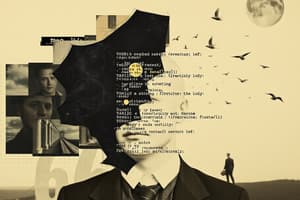Podcast
Questions and Answers
What are control structures used for in programming?
What are control structures used for in programming?
Control structures are used to control the flow of a program, allowing code to execute specific blocks based on conditions.
What are the six main control structures discussed?
What are the six main control structures discussed?
- Blocks, While Loops, Do While Loops, For Loops, If Statements, and Switch Statements (correct)
- Functions, Procedures, Modules, Classes, and Objects
- Input, Output, Storage, and Processing
- Arrays, Lists, Sets, Maps, Dictionaries, and Tuples
Variables declared within a block are accessible from outside that block.
Variables declared within a block are accessible from outside that block.
False (B)
What is the purpose of a While loop?
What is the purpose of a While loop?
If the condition in a While loop never becomes false, the loop will terminate.
If the condition in a While loop never becomes false, the loop will terminate.
What is the purpose of an If statement?
What is the purpose of an If statement?
An If statement can have an optional else clause to specify code to execute if the condition is true.
An If statement can have an optional else clause to specify code to execute if the condition is true.
What is an algorithm?
What is an algorithm?
Algorithms always terminate, meaning they have a definite ending point.
Algorithms always terminate, meaning they have a definite ending point.
What is pseudocode?
What is pseudocode?
Pseudocode can be refined progressively into smaller, more detailed sub-steps.
Pseudocode can be refined progressively into smaller, more detailed sub-steps.
List the steps involved in program development.
List the steps involved in program development.
Match the program development steps with their descriptions:
Match the program development steps with their descriptions:
Flashcards
Control Structures
Control Structures
Structures that manage program flow, executing code based on conditions.
Block
Block
A set of statements enclosed in curly braces ({}).
While Loop
While Loop
Repeats a block of code while a condition is true.
If Statement
If Statement
Signup and view all the flashcards
Algorithm
Algorithm
Signup and view all the flashcards
Pseudocode
Pseudocode
Signup and view all the flashcards
Refinement
Refinement
Signup and view all the flashcards
Program Development Steps
Program Development Steps
Signup and view all the flashcards
Infinite Loop
Infinite Loop
Signup and view all the flashcards
Scope
Scope
Signup and view all the flashcards
Boolean Expression
Boolean Expression
Signup and view all the flashcards
Study Notes
Control Structures
- Control structures are used to control the flow of a program.
- They provide a way to execute specific blocks of code based on conditions.
- There are six main control structures: Blocks, While Loops, Do While Loops, For Loops, If Statements, and Switch Statements.
Blocks
- A block is a group of statements enclosed in curly braces ({}).
- They define a scope, which determines the visibility of variables within that block.
- Variables declared within a block are only accessible within that block and any sub-blocks.
While Loops
- While loops repeat a block of code as long as a boolean expression evaluates to true.
- The expression is checked before each iteration.
- If the expression never becomes false, the loop will continue indefinitely (infinite loop).
- It is important to ensure that some condition inside the loop is changed to make the expression false eventually.
If Statements
- If statements allow the program to execute different sets of code based on a condition.
- They can have an optional
elseclause to specify code to execute if the condition is false. - The
ifblock is executed if the boolean expression evaluates to true. - The
elseblock is executed if the boolean expression evaluates to false.
Algorithm Development
- An algorithm is a set of unambiguous steps that can be followed to solve a problem.
- It is similar to a program, but algorithms always terminate.
- Pseudocode can be used to represent the steps in an algorithm before translating it to code.
Pseudocode and Refinement
- Pseudocode is a way of writing the algorithm's steps using a combination of English and programming concepts.
- It can be refined progressively by breaking down steps into smaller, more concrete sub-steps.
- This process allows for a gradual development of a program's logic.
Program Development Steps
- The program development process involves a series of steps:
- Designing the algorithm: Define the steps needed to solve the problem.
- Coding the algorithm: Translate the pseudocode into a programming language.
- Compiling: Check for syntax errors and convert the code into machine-readable instructions.
- Testing: Run the program and test its functionality.
- Debugging: Identify and fix errors in the program.
Studying That Suits You
Use AI to generate personalized quizzes and flashcards to suit your learning preferences.




